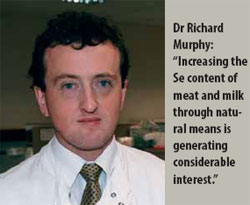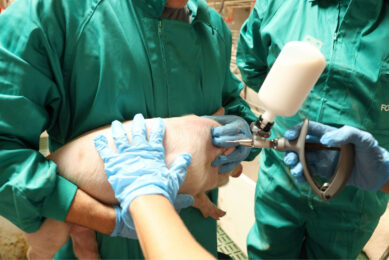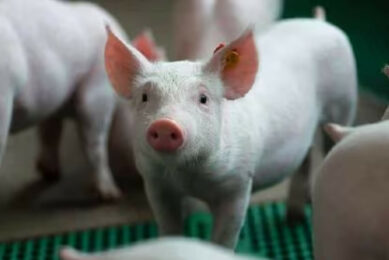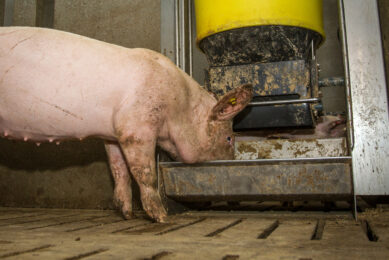A primacy in science and education – Part 2. The quest for functional food – selenium is the key

Animal husbandry has traditionally relied on the ease with which the outcome of breeding programmes could be judged, and for the most part, this has successfully resulted in the development and exploitation of genetic potential. Nutritionists are paying increasing attention to the value and bioavailability of nutrients in human diets and animal rations.
By Dr Richard Murphy
The complex interaction between an animal’s genotype, environmental factors and random variation ultimately determines the phenotype. With respect to environmental influences, animal nutrition has played a pivotal role in exploiting genetic potential. Dietary intervention to prevent disease through feed supplementation has become the norm; producers now realise that not only does an animal’s health and whole body homeostasis affect its performance but maternal health can influence the performance and health of its offspring. Nutritionists are paying increasing attention to the value and bioavailability of nutrients in human diets and animal rations.
Improving selenium status
Increasingly, disease states of primary selenium deficiency are being identified today in commercial production operations. Selenium supplements are available in several forms, both inorganic and organic. Sodium selenite and sodium selenate are the main inorganic forms of selenium and can be highly toxic at low levels. Selenate whilst somewhat absorbed following uptake, has extremely poor bioavailability with the majority being excreted in the urine before it can be incorporated into proteins. Selenite on the other hand is poorly absorbed by the body and is not considered suitable as a supplement. In contrast, supplementation with organic selenium in the form of Se yeast has been clearly demonstrated to improve whole body and tissue specific selenium status and is associated with a wide variety of responses that have a practical impact on animal health and performance.
There is substantial published evidence and practical experience to demonstrate that supplementing pig feed with Se yeast offers an excellent return on investment. The main benefits include:
- Better nutrition (enhanced Se status)
- Improved pig health (strengthened anti-oxidant and immune defenses)
- Reduced welfare problems (e.g. reduced lameness associated with marginal selenium status),
- Enhanced fertility
- Lower piglet mortality
- Improved sow/piglet performance
- Reduced culling of breeding animals
Selenium in inorganic forms such as sodium selenite has certain undesirable prooxidant effects, whereas the use of Se yeast has been shown to significantly improve the anti-oxidant status of animals. Apart from supporting health and immune functions in life, this also leads to better meat quality, including such parameters as reduced drip loss from meat, improvements in physical appearance such as colour and ultimately in keeping quality and shelf-life. Aside from improved keeping quality of meat, eggs and milk, Se-enrichment of foods offers long term nutritional benefits to consumers. It is well established that selenite or selenate dietary supplementation is not effective in increasing selenium concentration in the meat. However, organic selenium in the form of Se yeast can be added into diets fed to animals to produce selenium-enriched meats.
Organic selenium supplementation has been shown to more than double the selenium content in the loin of grower pigs than those supplemented with selenite. For example, supplementing selenium from selenite at 0.5 ppm of the diet increased loin selenium from 0.114 (control) to 0.189 ppm, whereas the same selenium dose from Se yeast produced loin selenium at 0.361 ppm. As a consequence, 100 g of such pork could provide almost 66% of the average EU Recommended Dietary Allowance (RDA) for selenium. This data underpins the technology of selenium-enriched pork (Se-pork) and this food is already on the market in Korea. Indeed selenium-enriched pork can be sold separately or can be included into various meat-based products to enhance their selenium content.
Milk
A large body of research work has demonstrated that the selenium content of milk is influenced by maternal dietary intake. In fact, selenium is one of only two micronutrients in milk to be affected in this way.
Additional studies using a porcine model demonstrated the increased bioavailability of dairy bound selenium resultant from organic selenium supplementation of the dairy herd diet. This series of studies resulted in a three-fold increase in plasma selenium compared to a control group, when selenised milk from a supplemented dairy herd was fed to pigs (Figure 1). A highly significant statistical increase in muscle selenium concentration was also noted in the same treatment group (Figure 2). Obviously the implications from this research into selenium transfer are far reaching and in effect what we are beginning to realise is that the form, content and application of selenium in the food chain can affect not only the selenium status of animals, including animal health and performance, but also the selenium status, health and longevity of consumers of animal products.
Human diets
Most human diets around the world do not supply sufficient daily selenium and this can have a major impact on health. Large bodies of research have also focused on the relationship between selenium and illnesses such as heart disease and cancer in humans. More recent work has also provided links between selenium homeostasis and wide ranging illnesses such as viral infections and Alzheimer’s disease.
Increasing the selenium content of meat and milk through natural means is generating considerable interest, particularly as a means of alleviating nutritional deficiencies in humans. Many studies have compared the form and the source of selenium supply to the final selenium concentration in milk. It has been shown that organic selenium is the form which yields the highest selenium concentration in milk and could provide a means of increasing the selenium intake of the population. Table 1 illustrates the potential for Se-enriched foods in the EU.Such is the extent of consumer and producer interest in the area of so-called functional foods that animal health and nutrition company Alltech has consulted with the European Food Safety Authority – with respect to identifying specific claims that could be made regarding the benefits accruing from nutritional supplementation with selenium.As a consequence, the EFSA Panel on Dietetic Products, Nutrition and Allergies (NDA) has recently accepted health claims linking the dietary intake of the company’s organic selenium product Sel-Plex to: “protection of DNA, proteins and lipids from oxidative damage, normal function of the immune system, normal thyroid function and normal spermatogenesis”. This will allow animal producers who enrich the selenium content of meat, milk and eggs through dietary supplementation to add further value to their products through the addition of these specific labelling claims:
- Selenium contributes to the protection of body cell constituents from oxidative damage
- Selenium contributes to the normal function of the immune system
- Selenium contributes to normal thyroid function
- Selenium contributes to normal spermatogenesis
This approach represents a new era in the area of functional foods. The nutritional enhancement of edible tissues with Se increases the options for product differentiation and extends the branding opportunities to products traditionally considered as commodity items, such as fresh or frozen pork and bacon. One only has to consider the potential for Se-enriched foods in the EU (Table 1) and one can quickly appreciate the branding opportunities that exists for organic selenium as part of the functional food chain.











